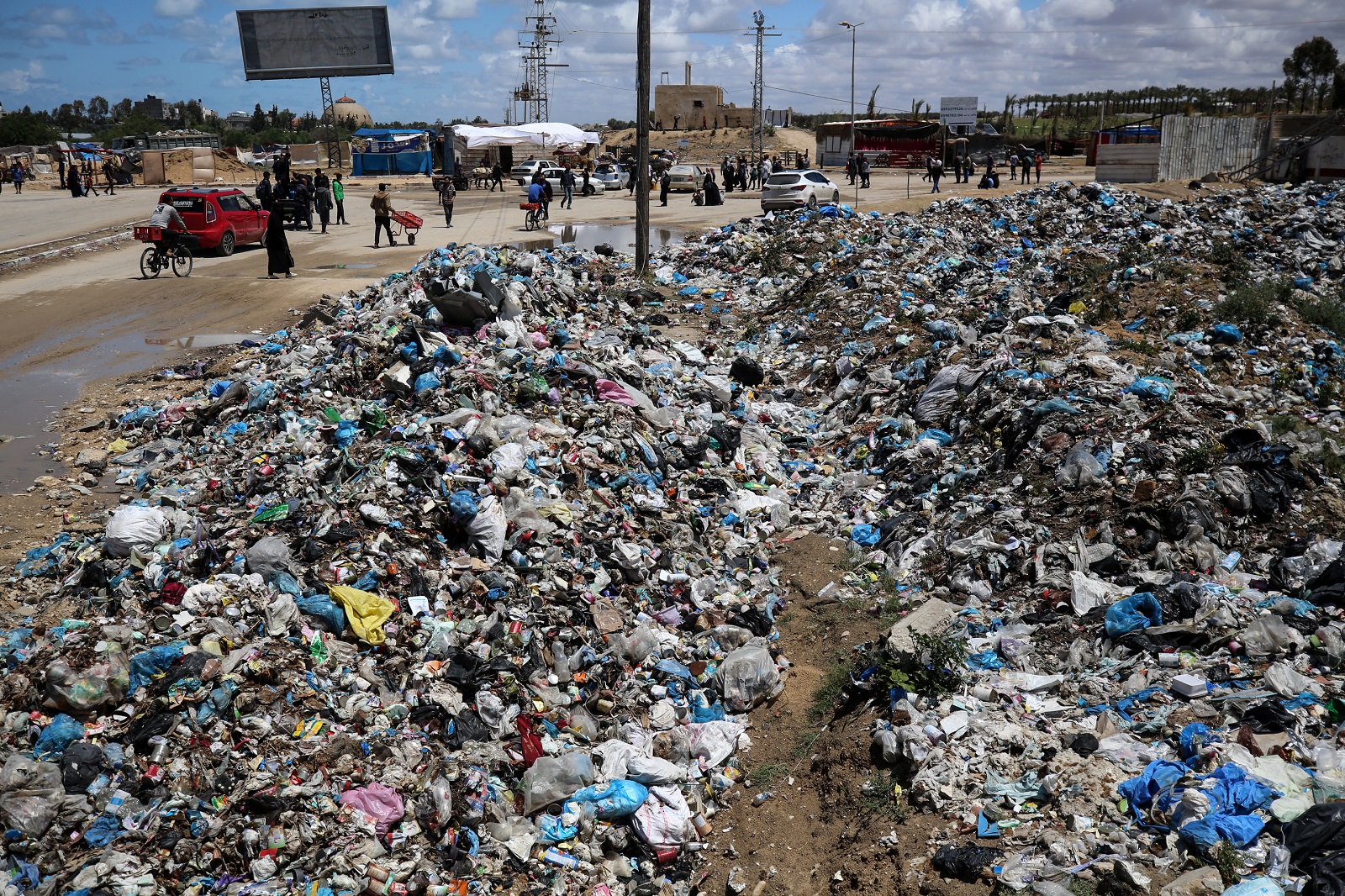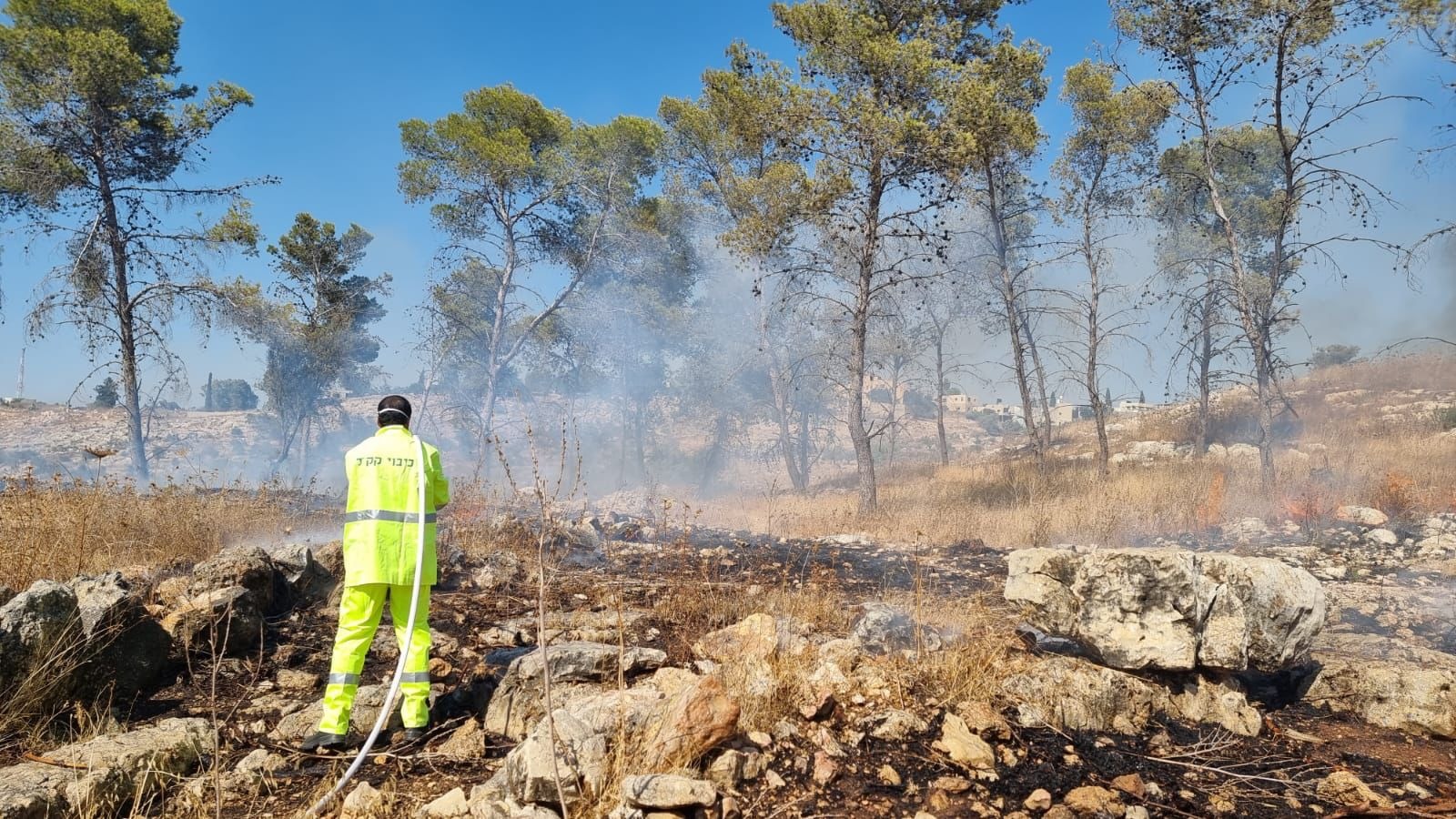Too Hot for Peace: Desertification, Global Warming Fueling Middle East Unrest
The increasing temperatures in the region are making natural resources, especially water, ever scarcer and making warfare conditions harder than ever
Much of 2023 was marked by global uncertainties that largely eclipsed the impending environmental crisis from international media. In Israel and most of the Middle East, since the terror attacks of October 7, ecological subjects have been given even less room than before as security concerns loomed drastically. However, with the upcoming summer, the extreme heat is becoming a common enemy to Israelis, Palestinians, and neighboring countries, regardless of what side they take in the current war.
Globally, around 100 million hectares of land are being desertified every year. In the Middle East, it’s a special problem because there is growing water scarcity and drought, impacting everyone, especially those working in agriculture.
Expert forecasts indicate that much of the Middle East and Northern Africa will experience an unusually hot summer in 2024. During this period, over 290 million people will suffer from extreme heat, which is made drastically more likely because of human-caused climate change. Louise Baker, the managing director of the global mechanism at the United Nations Convention to Combat Desertification (UNCCD), explained that “globally, around 100 million hectares of land are being desertified every year. In the Middle East, it’s a special problem because there is growing water scarcity and drought, impacting everyone, especially those working in agriculture.”
One of the region’s main problems is the shortage of drinking and irrigation water, according to Keren Kayemet LeYisrael (KKL-JNF) Chief Science Officer Dr. Doron Markel. He told The Media Line that many regions are getting drier, and the north of Israel suffers the most. “There is a decrease in rainy days during the winter. Over a multiyear perspective, even if the total amount of rain is the same, the number of rainy days is fewer, leading to intense rainfall and flood risks. Still, groundwater reservoirs are affected as they cannot absorb large quantities of water at once, and lots of water simply goes to the ocean,” he said.
While Israel isn’t expected to face water shortages since it will be able to compensate for the decline in natural water by desalinating a lot of water and using seawater for this purpose, “in the Middle East, the decrease in natural water greatly affects countries surrounding Israel, with some neighboring countries experiencing very poor conditions,” Dr. Markel explained.
Still, even if enough water is available in Israel through desalinization plants, “climate crisis models predict a decrease in rainfall in the northern Negev, leading to expected desertification and the desert line moving northward,” he added.
According to Michael Zaide, Israel’s Water Authority planning director, the Jewish state is experiencing a rise in water consumption, with home and urban use “increasing by about 1.8% annually. Agricultural water use remains steady in terms of fresh water, but there is an expected increase in water runoff use. Israel leads the world in wastewater recycling for agriculture, returning over 80% of treated wastewater to effluents. Future projections indicate an additional 400 million cubic meters of effluent will be added yearly by 2050.”
“To address a predicted decline in natural water supply—16% by 2050 and up to 25% by 2075—Israel is significantly expanding its seawater desalination capacity. The current output is 0.6 billion cubic meters annually, set to increase to 0.9 billion by 2030, 1.7 billion by 2050, and 2.8 billion by 2075,” Zaide detailed. “Enhancing transmission systems to accommodate this increased desalination output is a crucial part of Israel’s strategy to ensure a reliable water supply amid growing demand and decreasing natural resources.”
However, desalination is either too expensive or impractical for most countries in the Middle East and Palestine. Considering that many populational groups remain in poverty due to the scarcity of water resources and that these impoverished groups become potential targets for extremist ideologies recruiting potential terrorists, Global Warming is becoming a catalyst for violence in the Middle East.
Give the gift of hope
We practice what we preach:
accurate, fearless journalism. But we can't do it alone.
- On the ground in Gaza, Syria, Israel, Egypt, Pakistan, and more
- Our program trained more than 100 journalists
- Calling out fake news and reporting real facts
- On the ground in Gaza, Syria, Israel, Egypt, Pakistan, and more
- Our program trained more than 100 journalists
- Calling out fake news and reporting real facts
Join us.
Support The Media Line. Save democracy.
Regarding the Palestinians’ most pressing environmental problems, Dr. Ayman Rabi, executive director of Palestinian Hydrology Group, explained that “the reduction of the West Bank’s rainfall levels by up to 50%, the increasing desertification in parts of the West Bank, and the pollution of the Gazan coast are some of the problems that make it harder for Palestinian farmers and fishers,” Dr. Rabi added.
In Gaza, the situation is different because of the war. There is an immediate problem with waste management, both solid and liquid.
Then, there are the problems related to the conflict with Israel, where the extreme heat makes conditions even more unsanitary. “In Gaza, the situation is different because of the war. There is an immediate problem with waste management, both solid and liquid. Because the Israeli government imposes many restrictions on constructing sanitary landfills, Palestinians in Gaza don’t have sufficient sanitary capacity. This also causes health problems for humans since the solid waste gets burned, which results in toxic smoke and wastewater that further contaminates the soil and can cause diseases,” Dr. Rabi detailed.

Piles of garbage are accumulating in Khan Yunis, in the southern Gaza Strip, amid the ongoing conflict between Israel and Hamas, on May 6, 2024. (Majdi Fathi/NurPhoto via Getty Images)
Considering the small geographical size of Israel and the Palestinian-controlled territories and the severe impact of this 2024 extreme summer, allowing the construction of water management facilities can impact the whole regional ecosystem. “For the benefit of Israelis, Palestinians must be allowed to build and operate water resources and management facilities to treat and distribute water to their communities,” he said. “In our case, decentralized local systems in the different communities allow us to respond to these problems faster. Once things are being done correctly in Palestinian-controlled areas, it will also affect the entire region,” Dr. Rabi concluded.
Considering the human impact of extreme weather conditions, Dr. Colin Price, a professor in the Department of Geophysics at Tel Aviv University, explained that wildfires, extreme heat waves in the summer, and fierce storms in the winter would likely create scenarios with thousands of natural disaster refugees from Israel’s neighboring countries.
“A recent heat wave in Israel, Syria, and Lebanon started multiple fires and were a reminder of the challenges ahead. With the expected desertification, increase in heat waves, reduction in water resources, and rising sea levels, Israel may face significant regional instability and a surge of climate refugees at its borders, regardless if these countries are fighting each other,” Professor Price explained.
Focusing on how the extreme weather will impact people in the Middle East and conflict areas, Professor Price said, “Extreme heat impacts all humans, especially when we include the effects of humidity as well. In Gaza, along the coast like Tel Aviv, the humidity can be high all summer and gets higher at nighttime.”
Considering the high temperatures, a potential humanitarian crisis can become even deadlier in an extreme summer, he explained. “This can result in heat stress where the body stops functioning normally. Symptoms of heat stroke vary from confusion, slurred speech, loss of consciousness, profuse sweating, seizures, high body temperature, and, in extreme cases, even death. These extreme conditions can also hurt soldiers, whose demand for physical activity in such heat can also be dangerous for them,” he explained.
In extreme heat conditions, there is an increased chance of critical equipment failure in the field
Besides the direct human effects, the military must also deal with extreme heat for motors, engines, and generators, which quickly overheat in such conditions. “In extreme heat conditions, there is an increased chance of critical equipment failure in the field. So, to avoid extreme heat, more activities are being held during nighttime hours, when temperatures are lower.
Regarding the environment, rockets that land in forest areas are more likely to cause a large fire. “Given the extreme heat of the last weeks, the vegetation in the north loses its moisture by evaporations, and the hotter it is, the lower the moisture of the vegetation. Hence, any rocket landing in the dry vegetation will start a wildfire that is very difficult to extinguish in the severe heat conditions,” Professor Price concluded.

Rockets launched from Lebanon by Hezbollah have started many destructive fires in northern Israel this year. (Yoav Srur/KKL-JNF)
The UNCCD director, Baker, also shared her insights on how desertification is worsening all the conflicts in the Middle East. “Farmers often have to abandon their land because of the expansion of deserts. With it, you have families having to move to cities in the Middle East, where they end up living an impoverished life. When these people become desperate, they become easy targets for radicalization.”
“Israel has a lot to bring to the table. In addition to the water technology and desalination approaches, what we see Israel doing is a bit of a Swiss cheese model: Lots of layers of intervention ranging from water pricing, gray water reuse, and drip irrigation. The difference in the Israeli approach is having a full ecosystem around the problem. Including academics, practitioners, and business. The solutions are scientifically sound and easy to implement, so they can be used on the ground and can be turned into a viable source of income and even business opportunities for farming families,” she concluded.



